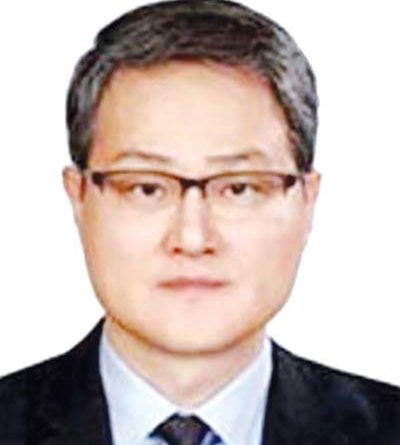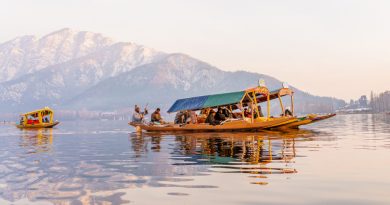S. Korea ready to invest in other sectors in Bangladesh: Ambassador
South Korea is looking to other sectors apart from ready-made garments for its future investments, although there still remain a number of challenges, South Korean Ambassador to Bangladesh Lee Jang-Keun has said.
Economics and business were the core of the relation between Bangladesh and South Korea, with infrastructure being another area the two countries can work on, the ambassador said during a visit to The Business Standard offices.
“Korea’s investment is already present in this country. It is the sixth biggest foreign direct investment country for Bangladesh with $1.3 billion. Two years ago, when I looked at this statistic, it was $1.1 billion. This investment is mainly in the RMG sector which is almost 80% of the total investment, which is too much for a particular sector.
“So, going beyond the RMG is what we are looking at in the future. We want companies from other sectors to invest here,” he said.
“Most of these companies are small and medium sized. Some of them have already invested in Mongla port and some in Adamjee EPZ,” he said.
“The next sector can be infrastructure which can also bring in other elements in the purview. Besides the Chattogram transport sector, we are involved in the Dhaka airport extension project although it is a Japanese project. Samsung is bringing in their technologies in Bangladesh,” he said.
Lee Jang-keun pointed out that one of the limitations of RMG is that only small and medium companies are involved in it. “But South Korea now has some very big companies like Samsung, Hyundai etc and they are coming for infrastructure. For example, if Samsung comes to the country and finds value here, they will stay here. Samsung also has a research institute very close to this place in Dhaka. They are also collaborating with Fairgroup and have installed four machines in their factory. If the Korean companies are successful, they will bring investment,” he said.
Although the ambassador did not specify which other sectors South Korea was looking at, he said that some steps had to be taken first.
“Here you have a good labour force of which I often hear from the Korean investors. But there are some problems like heavy traffic – which I experienced today. It can increase cost and take a lot of time for transport of goods and other things. It is a big challenge. The country should address this challenge to attract more investment,” Lee said.
The ambassador also said due to the geopolitical situation disrupting the supply chain, Korean companies were trying to diversify their sourcing countries.
“During the pandemic time, many Korean companies faced difficulties in some countries. Some of them even had to reduce or close their businesses. And then, they have increased their operation here,” he said.
On bilateral trade, Ambassador Lee said the volume was not enough and there were opportunities to increase it.
“Last year, our trade volume reached a historic high by crossing $2.1 billion. Korean export to Bangladesh was $1.6 billion or more and Bangladesh’s export was $555 million. So, Korea’s exports increased around 40%. And up to May this year, also, that increasing trend continued.
“At first, the trade volume should be increased and then we have to see the companies. As for investment, around 85% of our import from Bangladesh is RMG. So, Bangladesh has become a major RMG source for the Korean side. Before it was China or Vietnam. Many do not know that Korea is also providing preferential trade treatment and 95% of Bangladeshi products are tax-, quota-free since 2008. So, since 2008, trade volume has increased.”
Lee said it was time to think about other products aside from RMG to import from Bangladesh, especially fisheries and agriculture, terming those promising.
“And mangoes too. I really enjoyed the mango here. But currently, there is no direct maritime link or air link between Bangladesh and Korea. So, that is hampering the further development of our commercial ties. That is another area we are looking into.
“Korea is a peninsula which is surrounded by seas and there is a city called Busan and this is the second largest transshipment port in the world after Singapore. But we have no direct link with Bangladesh. So, a direct link would increase trade between the two countries.”
On expatriate Bangladeshis in South Korea, he said there were now 10,000 Bangladeshi workers.
“We have a quota system and we take around 2,000 Bangladeshi workers. The pandemic affected them heavily. From July 2020 up to October last year, we stopped taking workers. But from November last year up to now, more than 2,500 workers travelled to Korea. However, Korea is a preferred destination for Bangladeshi workers and the remittance that they send to Bangladesh is about $210 million. Korea was number 12th the year before the pandemic in terms of the amount. The Bangladesh government wants to send more workers to Korea and we are working on that.”
Asked what workers can do to be more attractive options for Korea, he said they needed to have a minimum skill in the Korean language.
“We have three BKTTCs [Bangladesh Korea Technical Training Centre] in Bangladesh in Savar, Mirpur and Chattogram. These centres provide various training to workers. However, we have 1,600 Koreans in Bangladesh and 1,200 are in Dhaka,” Lee said.
He also said there were many Bangladeshi students in Korea, mostly on scholarships, for doctorates and engineering.
In cooperation with Bangladesh, Lee said there was a plan for Chattogram public transportation.
“One important thing in this transport section cooperation is related to the Padma Bridge. A Korean company was supervising the construction of the bridge. So, Korean companies are in the infrastructural area. We are also installing an intelligent transport system [ITS] in Bangladesh, which is very common and widely used in Korea. It can automatically monitor the highway situation using ICT technology. It will be used on the Mawa expressway. I visited the expressway and was impressed by that.
“In Korea, we also have traffic problems, especially in Seoul. But the ITS system introduced there has lessened the problem. But in Dhaka, you also need to change the culture to solve this problem,” he said.
On what led to Korea’s progress in the last 50 years, the ambassador chalked it down to hard work, cooperation from other countries such as the USA, and education.
“Education is the area where our secret may lie. And the generation after independence did everything to secure education for their children and worked very hard. And I see a similar situation in Bangladesh…I see the rickshaw-pullers here which reminds me of their passion for life as they have to work very hard under the sun to earn a very small amount of money. The young students of the country are also very ambitious,” he said.
He also said Korea did not have natural resources, so human capital was the one they focused on.
“And we have very experienced political parties as well. I see that Bangladesh is now struggling for political democratization or modernization. It was only in 1997 that we had political democracy with multiple parties. Earlier, there was only one party which always came into power. But for democracy you also need a chance for the opposition party to have their share of power,” he said.
“Politicians are the respondent to the needs of the people of the country. And I believe that that’s why Korean culture is now thriving around the world like K-drama, K-pop, Squid Games etc. People are free there to pursue their dreams. I am now looking at Bangladesh for that to happen and I think in my lifetime it can happen.
“I see that the government of Bangladesh has played a role until now. They have ruled the country but what they should do is to let the people lead the country,” said Ambassador Lee.



